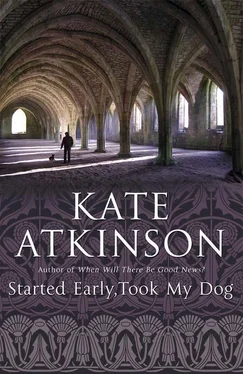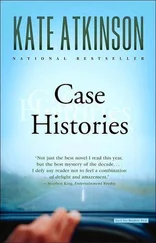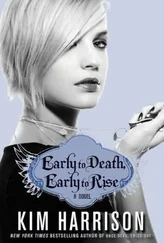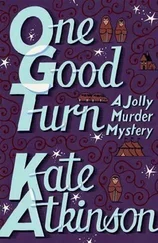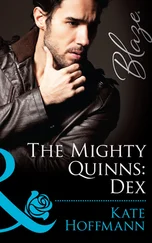Josie, his first wife, had once said to him that if he ran far enough he would end up back where he started but Jackson didn’t think that the place he had started from existed any more. He had returned a few years ago, taken Marlee to meet her dead relatives, and he had found that it wasn’t the town he remembered. The slag heaps were levelled, the mine’s machinery long gone, only the pit-head wheel remained, cut in two and planted on a roundabout on the outskirts of town, more like an ornament than a memorial. There was not much evidence to show that it had ever been a place where his father had spent his life toiling in the velvet dark.
Niamh herself had been underground nearly forty years – too late to track down clues, sniff out DNA, interview witnesses. The coffin was closed, the case as cold as that clay she was buried in. When she was murdered his sister was just three years older than his daughter was now. Marlee was fourteen. A dangerous age, although, let’s face it, Jackson thought, every age was a dangerous age for a woman.
Seventeen, Niamh’s life hardly begun when it was halted. His sister couldn’t stop for death, so he had, very kindly, stopped for her. Emily Dickinson. Poetry? Jackson? Believe it or not.
Poetry had started to get under his skin a couple of years ago, round about the time he had almost died in a train crash. (In synopsis, Jackson ’s life always sounded more dramatic than the mild ennui of living it every day.) He didn’t think the two things necessarily had anything to do with each other, but in his resurrected life he had decided to catch up, rather late in the day, with some of the things he had missed out on in his impoverished education. Like culture, for example. While living in London he had committed himself to a programme of self-improvement, feasting from the liberal banquet on offer in the capital – art galleries, exhibitions, museums, even the occasional classical concert. He developed a bit of a taste for Beethoven, the symphonies at any rate. Lush and tuneful, they seemed designed to address the soul. He caught the Fifth at the Proms. He’d never been to the Proms before, put off by all those jingoistic Last Night shenanigans, and, indeed, the self-important Promenaders proved to be over-privileged smug wankers but Beethoven hadn’t written the music for them. He had written it for Everyman, in the guise of a middle-aged trooper who was surprised to find himself moved to tears by the triumphant blossoming swell of brass and horsehair.
Not a lot of theatre, Julia and her actor friends had killed off any hope for him in that arena. He had made the mistake of taking Marlee to three hours of bum-numbing Brecht, by the end of which he wanted to shout out, ‘Yes! You’re right, the earth revolves around the sun, you said that when you first came on stage, you’ve been saying it ever since, you don’t need to keep saying it. I get it!’ Marlee slept through most of it. He loved her for that.
This attempt at betterment had extended beyond paintings and piano recitals and museum artefacts, he had also been grimly working his way through the world’s classics. Fiction had never been Jackson ’s thing. Facts seemed challenging enough without making stuff up. What he discovered was that the great novels of the world were about three things – death, money and sex. Occasionally a whale. But poetry had wormed its way in, uninvited. A Toad, can die of Light! Crazy. So that here he was, thinking of his long-dead, long-lost sister, bolstered by a woman who felt a funeral in her brain.
As he left Jervaulx, Jackson had placed a twenty-pound note in the honesty box – more than any English Heritage fee but it was worth the money. And besides, he liked the fact that even in these days and times there was someone willing to trust to a man’s honesty.
When he was thirteen Jackson had spent one of the better summers of his life staying on a farm called Howdale on the edge of the Yorkshire Dales. He was never sure how this rural idyll had come about, church or state, one of them was probably involved somewhere along the line – the parish priest or his social worker must have organized it, he supposed. The social worker had been a temporary acquisition, appearing out of the blue one day in the middle of the worst year of his life and disappearing just as mysteriously a few months later, even though it was still the worst year of his life. The social worker was there (apparently) to help guide him through that terrible year of bereavement which began with his mother dying of cancer and ended with his brother killing himself after their sister was murdered. (‘Top that if you can,’ he occasionally found himself thinking grouchily when he was a policeman and listening to some stranger’s less impressive lament.)
The holiday at Howdale had been a reprieve from the bleak afterlife he was sharing with his father, an angry man with a heart of coal. At the time, Jackson didn’t analyse his feelings of grief, nor did he wonder why a pleasant, elderly man he had never met before (‘I’m what they call a volunteer, lad’) drove him from his small, soot-encrusted terraced home to the green outback of the Dales, dropping him in a farmyard where a herd of black-and-white cows were in the act of shouldering their way into a milking parlour. Jackson had never been close up to a cow before.
The farm was run by a couple called Reg and Joan Atwell. They had a grown-up son and daughter. The son worked for an insurance company in York and the daughter was a nurse at St James’s Infirmary in Leeds and neither of them was interested in running the Atwells’ fifth-generation farm. The wolf child that Jackson had become must have been a severe trial for the Atwells’ patience, but they had been unusually tolerant and kind people and Jackson hoped he hadn’t disappointed them, and if he had he was certainly sorry now.
He could still see the farmhouse kitchen with the Rayburn that was always hot and was home to a big brown teapot containing tea the colour of old oak leaves. He could still smell the huge breakfasts, porridge with cream and brown sugar, fried eggs, ham, bread and home-made marmalade that Mrs Atwell served up. Two farm workers joined them at breakfast, men who had already put in half a day’s work by the time they sat down to breakfast.
There was an ancient sofa in the kitchen, covered with a scratchy crocheted throw, where they sat in the evenings. The Atwells more or less lived in the kitchen. The sheepdog, a Border collie, Jess, would lie on the rag rug in front of the Rayburn. Mr Atwell would say, ‘Make room on the sofa for the boy, Mother,’ but Jackson often as not sat on the rag rug with Jess. It was the only time before or since that Jackson could recollect feeling close to a dog. His family never had a pet and, when he had his own family, his wife, Josie, had restricted their pet ownership to the small end of Creation – hamsters, guinea pigs, mice. When she was little his daughter, Marlee, used to have a pet rabbit, Muffin, a big brute of a thing with floppy ears that used to square up to Jackson as if he was in the ring with it and prepared to go the distance. ‘Pet’ wouldn’t have been the word Jackson would have used to describe it.
He had given a Border collie to Louise. A puppy. It had been an unconscious choice. He had fled from Scotland, and DCI Louise Monroe, and in his place he had – unconsciously – left a creature close to his emotional heart. She was better off with the dog than with him. He could never be with Louise now. She was within the law, he was outside it.
There had been some talk of him staying on at Howdale at the end of the summer but unfortunately he had been returned, by the same mysterious, elderly gentleman, to the grim comforts of home. Jackson wrote to the Atwells (the first letter he had ever written), thanking them for their hospitality, but heard nothing back until several months later their daughter wrote to him (the first letter Jackson had ever received) to ‘inform’ him that her parents had died within a month of each other, her father first, of an unhealthy heart, and then his wife of a broken one. Jackson, having imbibed guilt in his Catholic mother’s milk, felt the unspoken accusation that he had somehow contributed to their untimely deaths.
Читать дальше
